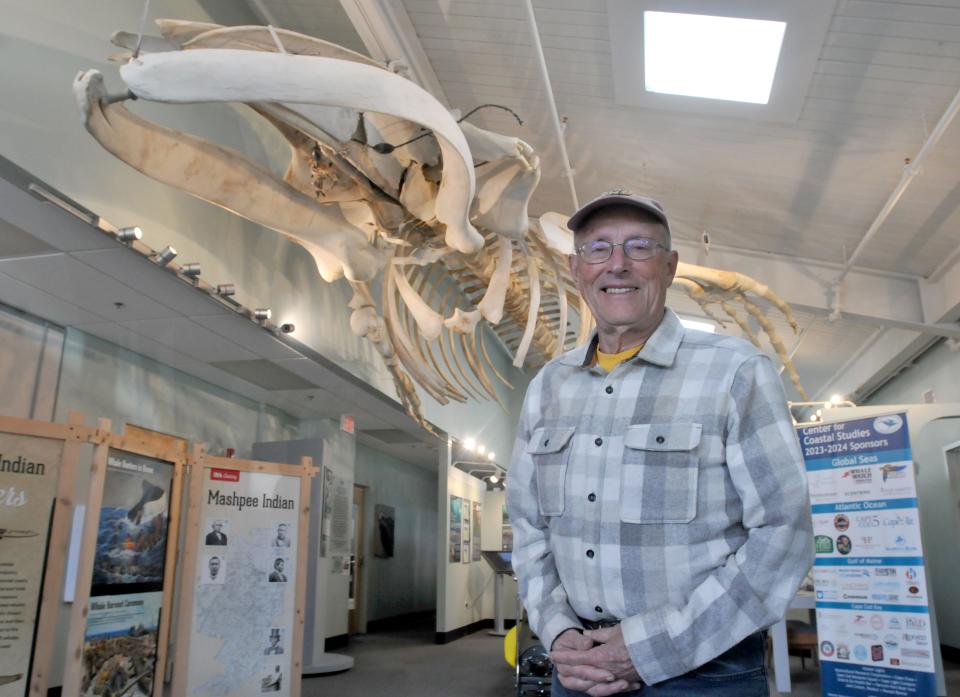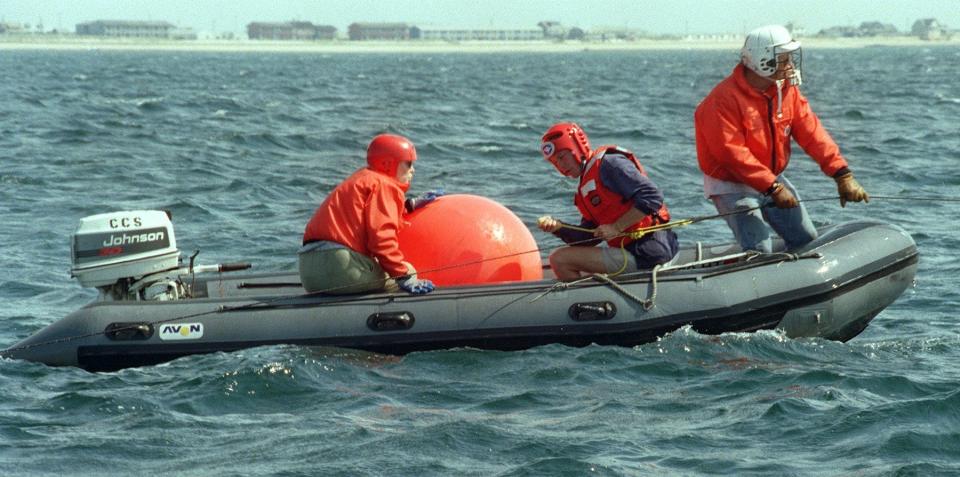'A living, breathing thing.' Stormy Mayo retires after 48 years of right whale studies
One of Charles "Stormy" Mayo's most vivid memories as a 10-year-old growing up in Provincetown was the first time he saw a humpback whale propel itself out of the water and come splashing down.
"It’s still a snapshot in my brain of the whale in the air with its flippers out," he said, recalling the day, watching with his dad from their boat's flying bridge just south of Wood End Light.
Little did he know then that Cape Cod Bay's whales would one day inspire him to co-found the Center for Coastal Studies, today a respected multidisciplinary scientific institution, nor that he'd become not only a leading expert in North Atlantic right whale ecology, but also in whale disentanglement methods.
Now, 48 years after the center was formed, Mayo, who has long served as the director of its right whale research program, is retiring. For him, it's been all about pursuing a passion for marine science, starting with a deep interest in plankton and larval fish research, and expanding to whales.
"It’s been really fun," he said. "It really was never a job."

Mayo, known by the nickname his dad gave him because he was born during a gale, takes a lot of pride in the center.
"I tip my hat to the people who came into my orb. All of them bright, genuine and dedicated," he said. "The work and the discoveries are very exciting. But as exciting are the people who dedicated themselves and went on to make very significant contributions to the field."
On Wednesday, known as Massachusetts Right Whale Day, Mayo was celebrated by state legislators and the marine science community at the New England Aquarium in Boston. Mayo was presented with a special legislative citation recognizing him for his role in advancing the study and protection of North Atlantic right whales. He also received a commemorative right whale license plate.
On May 10, Mayo's colleagues at the Center for Coastal Studies are planning an evening to celebrate his "remarkable career" at the Provincetown Town Hall.
Center for Coastal Studies was 'serendipity'
Looking back, Mayo said the fact that the Center for Coastal Studies even started "was all serendipity. It was not a plan."
Mayo and his first wife, the late Barbara Shuler Mayo, were hired by the Environmental Protection Agency to evaluate a possible pollution problem off Puerto Rico's northern coast. At the time, he was already thinking about leaving his job as a senior scientist for the Southeast Fisheries Science Center in Miami so he could come home to build a schooner. The money from the EPA project allowed him to do that, he said.
The couple moved in next door to Captain Al Avellar, founder of what is now the whale watch company Dolphin Fleet of Provincetown. Avellar was starting a marine bird and whale cruise and offered to pay Mayo to come on cruises to talk about marine life. Though he wanted to "stay out of science and get this boat built," he agreed to become the fleet's first naturalist.
It was through that experience, he said, "we discovered there were lots of whales," and it opened up an opportunity to undertake research he couldn't resist.
Another lucky thing was meeting a fellow scientist, Graham Giese, at a public hearing in Provincetown. Mayo, his wife and Giese found they shared a passion for marine science, and that became the foundation for the center.
Pioneering the skill of disentangling whales
In 1984, David Mattila — who is now involved with the center's marine animal entanglement response program — began collaborating with Mayo on the whale disentanglement work for which they are now well known. Although entanglement wasn't as big of an issue as it is now, there were some instances of it, and they wanted to help.
"He and I started developing methods for cutting whales free of fishing rope," Mayo said.
Today, the center is home to a full-on disentanglement program and is associated with an international program that teaches disentanglement methods.
Mayo recalls his first successful disentanglement as if it was yesterday: A humpback whale named Ibis. On Thanksgiving Day, 1984, he and Mattila, along with a small crew, responded after getting word of a whale wrapped in fishing net. Mayo recognized the animal — a month prior, he'd taken part in efforts to free the whale off Gloucester, but she'd sunk into the depths and didn't reappear.

With a second chance to help, the team needed to figure out how to cut Ibis free without again losing her to a dive. Mayo's father, who was captaining the boat, had the answer: "kegging" — an old whaling technique of attaching empty kegs to slow whales and keep them from diving.
And so it was that a method once used to hunt whales was put to use to save one. In this case, they employed a dory and "used one of those big orange balls that fishermen use," rope and a grapple hook, he said.
Ibis had been swimming with the entanglement for so long that the ropes had dug into her skin. The experience of reaching into the wounds to cut rope away and seeing the animal bleed, Mayo said, "was really one of the most dramatic things I've ever felt."
"It was, 'my God, this is a living, breathing thing. It’s not this scary thing. It’s not this big, rock-hard body that is difficult to relate to. It’s actually alive and it’s bleeding,'" he said. "How odd to reach into the cut of an animal whose tail is spread out 8 to 10 feet across and see this relationship between two animals just by the fact that it was doing something you or I do that shows our vulnerability. Bleeding."
A right whale revelation
Disentanglement was just part of the center's early work. Mayo's first whale research focused on the humpbacks that frequent the bay in the summer.
That focus expanded in the mid-'80s amid "lots of reports of whales in the middle of the winter, when the humpback whales weren't supposed to be here." Mayo decided to investigate, and on Jan. 30, 1985, the team documented their first right whale. It was "the beginning of a discovery that right whales were here in great numbers," Mayo said, laying the groundwork for the center to become a globally renowned home for right whale research.
Since then, Mayo and his team have revealed Cape Cod Bay to be "a feeding habitat of critical importance" for right whales, he said. Most of the population of the critically endangered species spends time in the bay feeding, socializing and nursing newborns during the whales' annual migration north for summer.
From whales to marine geology and beyond
Over the years, the center has steadily expanded into other areas of research and action. Mayo gives credit to the center's executive board and executive directors for guiding its growth into "quite an active and multidisciplinary organization."
Now it includes programs focusing on marine geology, fisheries, seals, sharks, water quality studies, ghost gear and beach cleanups, and education.
Going forward, Mayo predicted the center "will be increasingly dealing with the changes that are coming to our system because of climate change." And, though he will be peripherally a part of that as he continues to do some things behind the scenes, he's also looking forward to having more time for his other "fanaticisms": Growing dahlias and "maybe more sailing."
Heather McCarron can be reached at hmccarron@capecodonline.com, or follow her on X @HMcCarron_CCT
Thanks to our subscribers, who help make this coverage possible. If you are not a subscriber, please consider supporting quality local journalism with a Cape Cod Times subscription. Here are our subscription plans.
This article originally appeared on Cape Cod Times: Stormy Mayo is retiring: Here's what he helped discover in Cape waters

